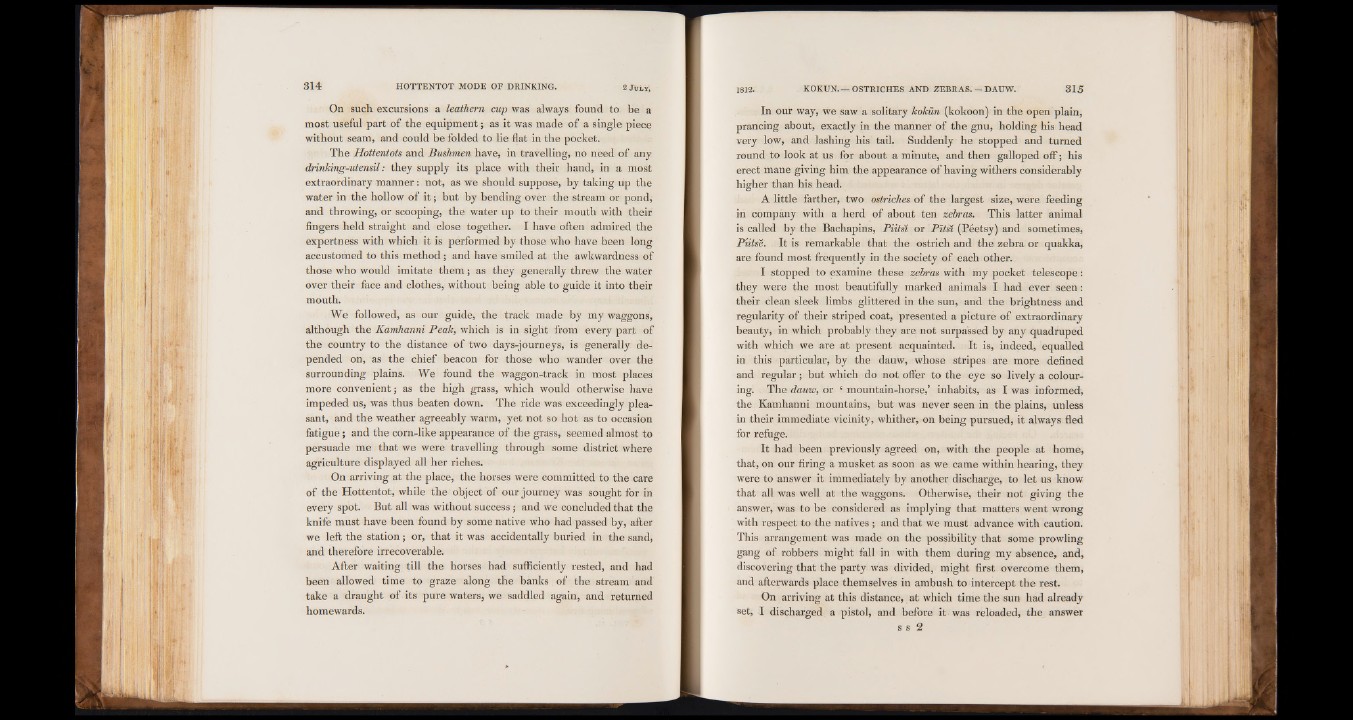
On such excursions a leathern cup was always found to be a
most useful part of the equipment; as it was made of a single piece
without seam, and could be folded to lie flat in the pocket.
The Hottentots and Bushmen have, in travelling, no need of any
drinking-utensil: they supply its place with their hand, in a most
extraordinary manner: not, as we should suppose, by taking up the
water in the hollow of it ; but by bending over the stream or pond,
and throwing, or scooping, the water up to their mouth with their
fingers held straight and close together. I have often admired the
expertness with which it is performed by those who have been long
accustomed to this method; and have smiled at the awkwardness of
those who would imitate them; as they generally threw the water
over their face and clothes, without being able to guide it into their
mouth.W
e followed, as our guide, the track made by my waggons,
although the Kamhanni Peak, which is in sight from every part of
the country to the distance of two days-journeys, is generally depended
on, as the chief beacon for those who wander over the
surrounding plains. We found the waggon-track in most places
more convenient; as the high grass, which would otherwise have
impeded us, was thus beaten down. The ride was exceedingly pleasant,
and the weather agreeably warm, yet not so hot as to occasion
fatigue; and the corn-like appearance of the grass, seemed almost to
persuade me that we were travelling through some district where
agriculture displayed all her riches.
On arriving at the place, the horses were committed to the care
of the Hottentot, while the object of our journey was sought for in
every spot. But all was without success; and we concluded that the
knife must have been found by some native who had passed by, after
we left the station; or, that it was accidentally buried in the sand,
and therefore irrecoverable.
After waiting till the horses had sufficiently rested, and had
been allowed time to graze along the banks of the stream and
take a draught of its pure waters, we saddled again, and returned
homewards.
In our way, we saw a solitary kokun (kokoon) in the open plain,
prancing about, exactly in the manner of the gnu, holding his head
very low, and lashing his tail. Suddenly he stopped and turned
round to look at us for about a minute, and then galloped off; his
erect mane giving him the appearance of having withers considerably
higher than his head.
A little farther, two ostriches of the largest size, were feeding
in company with a herd of about ten zebras. This latter animal
is called by the Bachapins, Piitsi or Pitsi (Peetsy) and sometimes,
P'ntse. It is remarkable that the ostrich and the zebra or quakka,
are found most frequently in the society of each other.
I stopped to examine these zebras with my pocket telescope:
they were the most beautifully marked animals I had ever seen:
their clean sleek limbs glittered in the sun, and the brightness and
regularity of their striped coat, presented a picture of extraordinary
beauty, in which probably they are not surpassed by any quadruped
with which we are at present acquainted. It is, indeed, equalled
in this particular, by the dauw, whose stripes are more defined
and regular; but which do not offer to the eye so lively a colouring.
The dauw, or ‘ mountain-horse,’ inhabits, as I was informed,
the Kamhanni mountains, but was never seen in the plains, unless
in their immediate vicinity, whither, on being pursued, it always fled
for refuge.
It had been previously agreed on, with the people at home,
that, on our firing a musket as soon as we came within hearing, they
were to answer it immediately by another discharge, to let us know
that all was well at the waggons. Otherwise, their not giving the
answer, was to be considered as implying that matters went wrong
with respect to the natives ; and that we must advance with caution.
This arrangement was made on the possibility that some prowling
gang of robbers might fall in with them during my absence, and,
discovering that the party was divided, might first overcome them,
and afterwards place themselves in ambush to intercept the rest.
On arriving at this distance, at which time the sun had already
set, I discharged a pistol, and before it was reloaded, the answer
s s 2